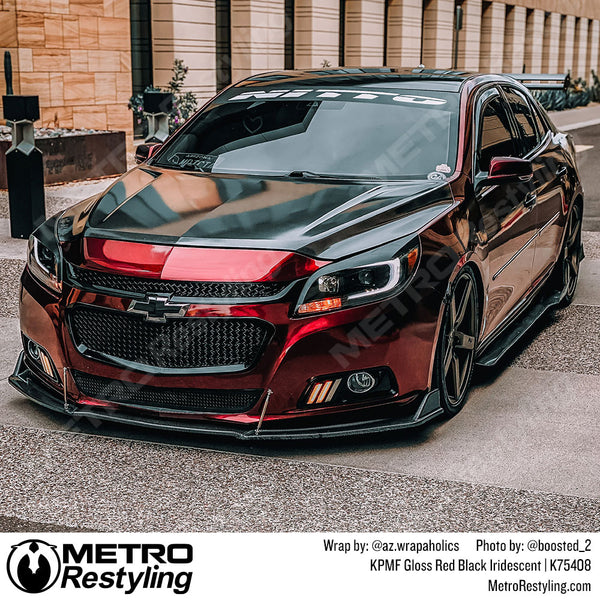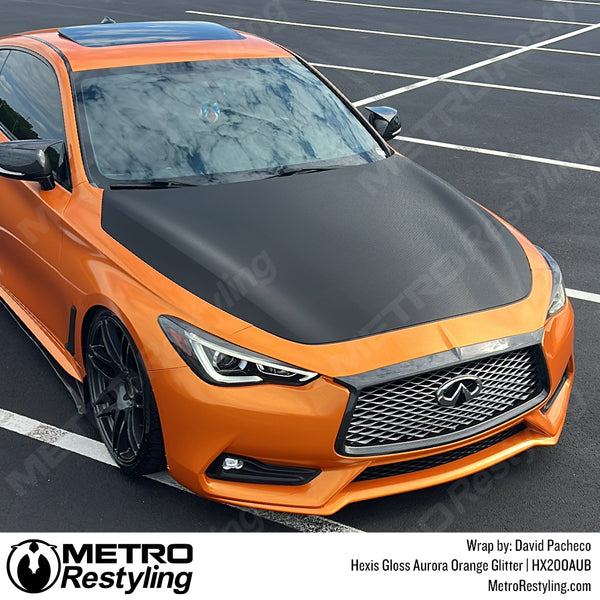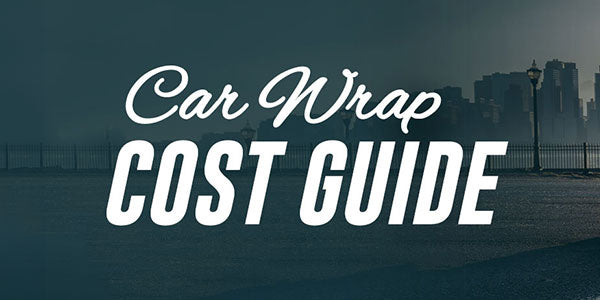As the top provider of vinyl wrap, PPF, and tools, picking the ideal vinyl for your project might be difficult. Today, we're delving further into vinyl films by contrasting calendered and cast vinyl wrap, a subject that experts and hobbyists find very contentious.
This in-depth tutorial will examine the differences between cast and calendered vinyl, including their advantages, best uses, and distinguishing characteristics. Our objective is to assist you in making an educated choice that will ultimately save you time and money, whether you're wrapping a car, a boat, or even non-automotive goods like computers and worktops.
What is Cast Vinyl Wrap?
A continuous casting method creates the high-performance film known as cast vinyl wrap. This process creates a thin, homogeneous, and very conformable material by extruding the vinyl onto a casting sheet. Because of its precision production technique, cast vinyl performs very well when applied to intricate curves and shapes.
Cast Vinyl Wrap's Advantages Include Superior Conformability
Cast vinyl is well known for its capacity to adapt to automobiles' complex surfaces and curves. Because of this, it's the perfect option for covering automobiles with fine detailing or complicated forms. Because of its elasticity, bubbles and creases are less likely during installation, ensuring a flawless finish.
Superior Finish
Cast vinyl has various finishes, such as matte, gloss, satin, chrome, and textured. It adds a high-end look to any project, and many other varieties of vinyl cannot match its opulent finish, so your wrap will stand out from the crowd.
UV Stability and Longevity
Cast vinyl's durability is one of its main benefits. Its superior UV stability—the capacity to endure extended exposure to sunshine without fading or deteriorating—is a result of its superior manufacturing technique. This makes it ideal for outside uses, such as maritime projects and car covers.
Resistance to Lifting and Shrinkage
Over time, cast vinyl maintains its integrity. Even under challenging circumstances, the wrap will stay securely in place once applied because it is resistant to lifting and shrinking. This dependability is essential for projects where long-term durability is a top concern.
Applications for Cast Films
Cast vinyl is far more versatile than just covering cars. These are a few well-liked applications:
- Vehicle Wrapping: The most popular use, where its exceptional conformability and durability are crucial.
- Marine Applications: Cast vinyl's ability to withstand UV radiation and the severe conditions of the sea is advantageous for boats and other watercraft.
- Outdoor Advertising: Its resilience makes it perfect for signs that withstand weather conditions.
-
Other Items: Cast vinyl is also used on computers, game controllers, refrigerators, countertops, and other surfaces for a smooth and long-lasting surface.
Cast Vinyl Wraps: Who Sells Them?
Several high-end brands of cast vinyl on the market are renowned for their excellence. Among the notable manufacturers are:
We at Metro Restyling ensure you have access to the best-cast vinyl available by providing a carefully chosen assortment of the best car wraps.
Calendered Vinyl Wrap: What Is It?
Calendering is the procedure used to create a calendered vinyl wrap instead of casting vinyl. Pushing the vinyl through a succession of rollers gives it a uniform thickness and polish. Despite being less costly than casting, this process results in a film that is often less durable and conformable than its cast equivalent.
Cost-Effectiveness Advantages of Calendered Vinyl Wrap
Calendered vinyl's cost is one of its main benefits. It is often less expensive than cast vinyl, which makes it a desirable choice for applications where money is a key factor. Calendered vinyl may be the best option if price plays a significant role in your decision-making.
A Range of Finishes and Colors
Calendered vinyl wraps, with their wide range of colors and finishes, allow for great personalization. Because of their adaptability, they are often used for graphics, signs, and other applications that require striking visual appeal.

Applications for Calendered Films
Calendered vinyl is still commonly used in many different applications, even if it may not work as well as cast vinyl on steeply curved surfaces:
- Vehicle Wrapping: Calendered vinyl works best on cars with milder curves. It also works well for automobiles with little curves or flat surfaces.
- Graphics and Signage: It is a popular option for visual displays and commercial signs because of its affordability and variety of finishes.
- Windows and Walls: Calendered vinyl is a long-lasting option for both beautiful and practical uses, and it can be used on both exterior and interior surfaces.
A Comparative Analysis of Calendered and Cast Vinyl
There are several considerations when contrasting calendared with cast vinyl:
- Durability: Wraps made of cast vinyl are more resilient and durable. They usually outlive calendared vinyl because they are resilient to external elements, including UV radiation and temperature changes.
- Removal Ease: Calendered vinyl may be more challenging than cast vinyl. The thickness and adhesive qualities may make the procedure more difficult.
- Cost vs. Quality: Cast vinyl's excellent quality and durability may save you money over time, even if calendered vinyl is initially less costly. Purchasing high-quality vinyl might also reduce upkeep expenses and the frequency of repairs.
- Installation: While calendered vinyl may take more expertise to install appropriately on curved surfaces, cast vinyl's remarkable conformability makes it simpler to put on complicated surfaces without worrying about wrinkles or bubbles.
Calendered vinyl is a wise option for anyone working on projects without intricate curves or a limited budget. Cast vinyl is the better choice if you want the highest performance and a perfect finish.
Click the link to read about the Best Cast Vinyl Wraps
Selecting the Proper Vinyl for the Task
The nature of your project and your particular requirements will determine whether you choose calendered or cast vinyl wraps. Here are some essential things to think about:
- Project Complexity: Cast vinyl is often preferable for covering a boat exposed to severe weather conditions or a car with complex curves. Its conformability and durability guarantee a professional finish.
- Budget: Calendered vinyl provides an affordable option without significantly sacrificing quality for projects where money is the primary consideration, and the application surface is comparatively flat.
- Aesthetic Requirements: Consider the desired finish and appearance. Cast vinyl offers a premium finish in various textures (matte, gloss, satin, chrome, and textured), which might improve your wrap's overall look.
- Durability and Maintenance: Purchasing cast vinyl will be more advantageous in the long run if you want a wrap that will last for an extended period with little maintenance. It requires fewer replacements and repairs because of its resilience to lifting, shrinking, and UV deterioration.
-
Suggested Products: We suggest CYS vinyl wrap for those who choose calendered vinyl. With a wide selection of colors and finishes to suit various purposes, it is often regarded as better and more affordable than other foreign films.

After carefully analyzing these criteria, you can choose the vinyl that best suits your project's needs and budget. Our staff at Metro Restyling is always available to help you make this selection and ensure you obtain the ideal vinyl wrap for your requirements.
Real-World Uses: Where to Put Each Type
Applications for Cast Vinyl Wrap
- High-End Vehicle Wrapping: Cast vinyl is unparalleled in providing a superior finish and seamlessly covers curves on luxury and performance automobiles.
- Marine Projects: Cast vinyl is the best choice for boat and yacht wraps because it can resist the damaging effects of UV light and seawater.
- Outdoor Advertising: Cast vinyl's strength and permanence make it ideal for billboards, banners, and vehicle graphics.
- Consumer Electronics and Home Décor: Cast vinyl adds flair and protection to anything from gaming controllers to laptops to worktops.
Applications of Calendered Vinyl Wrap
- Typical Car Wrapping: Calendered vinyl provides a nice finish at a lesser cost, making it ideal for cars with fewer curves.
- Commercial Signage and Graphics: Calendered vinyl is inexpensive and comes in various colors, so businesses often use it for storefront signage and promotional displays.
- Interior Applications: Calendered vinyl wraps are a great way to update windows, walls, and other flat surfaces in homes or businesses.
Which Should I Choose?
The final decision between calendered and cast vinyl wraps depends on your project's requirements. At Metro Restyling, performance and quality shouldn't be sacrificed. Cast vinyl is still the best option for projects needing a high-quality finish, exceptional conformability, and endurance, even if calendered vinyl offers a flexible and affordable option for many uses.
Being the market leader in vehicle wraps, we take pride in providing a wide selection of goods, such as PPF, quality vinyl, and necessary tools to help you get excellent results. We're dedicated to providing the highest caliber of quality and service, whether you're wrapping a vehicle, boat, or anything else.
Making the correct premium vinyl wrap investment today may save you future worry, money, and time. Visit Metro Restyling to learn more about our services and why our clients rely on us for their vinyl wrap requirements. You deserve the best for your project; with our experience, you're one step closer to success.
FAQ
Q: What is the primary difference between calendered and cast vinyl?
A: Calendered vinyl is made using a rolling technique that provides cost-effectiveness and a variety of finishes. At the same time, cast vinyl is made using a casting process that yields higher conformability and durability.
Q: Which kind of vinyl works best for wrapping cars with intricate curves?
A: Cast vinyl's exceptional flexibility and resistance to shrinkage make it the perfect material for cars with complex curves and geometries.
Q: Are cast vinyl wraps more expensive than calendared vinyl wraps?
A: Yes, calendered vinyl wraps are a popular choice for applications with limited funds since they are often more affordable.
Q: Is it possible to utilize cast vinyl for purposes other than automotive?
A: Of course. Because of its versatility, cast vinyl is utilized for outdoor advertising, nautical applications, and even personalizing items like gaming controllers and computers.
Q: What factors should I consider while deciding between calendered and cast vinyl?
A: Consider project length, desired finish, budget, and complexity. Calendered vinyl works well for jobs with a tight budget and flatter surfaces. In contrast, cast vinyl delivers superior quality and longevity.






3 comments
Tim
My calendered vinyl lasted 10 months in a cloudy state before it started fading badly. Only using cast in the future. The price difference is small. Go with cast and thank me later.
FFS
Jerry R. – Rolls Royce are far superior to a lot of cars, doesn’t mean it’s the only option.
Jerry R
Cast vinyl is far superior, 100%. I only sell cast at my shop